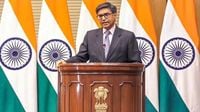In a dramatic escalation of hostilities, the India-Pakistan conflict has reached new heights, with both nations engaging in military operations that have led to significant casualties and damage. On May 10, 2025, Indian forces shot down multiple Pakistani drones and destroyed several military posts, as Islamabad continued its attempts to target military installations and civilian air facilities along India’s northern and western borders.
According to officials, Indian air defense systems successfully "engaged and destroyed" several drones near Amritsar, close to the Pakistan border. The Indian response inflicted significant damage, including the destruction of a terrorist launchpad. The Indian Army has condemned Pakistan's drone aggression as "unacceptable" and reaffirmed its commitment to countering every hostile act posed by the enemy.
In a decisive response to the escalating hostilities, the Indian Armed Forces launched precision strikes on key Pakistan Air Force bases, including Rafiq, Murid, Chaklala, and Rahim Yar Khan. Additional sites at Sukkur, Pasrur, and Sialkot were also targeted. Indian defense officials confirmed the use of air-launched precision weapons, with minimal collateral damage reported. Meanwhile, Pakistan retaliated with drone intrusions and missile attacks targeting Indian bases, causing limited damage at Udhampur, Pathankot, Adampur, and Bhuj.
As tensions mounted, India rejected Pakistani misinformation and stated that it remains prepared for further escalation if necessary. The U.S. has distanced itself from the conflict, stating it is "fundamentally none of our business," while former President Trump claimed that India and Pakistan had agreed to a ceasefire, a statement that has yet to be officially confirmed.
In the midst of these developments, the Indian government has taken measures to ensure emergency preparedness across various sectors. Delhi Chief Minister Rekha Gupta has directed top officials to prepare for emergency situations, while the Jammu & Kashmir government announced ₹10 lakh aid for families of victims of Pakistani shelling.
On the diplomatic front, Russia has assured full support to India in its fight against terrorism, promising to fulfill military orders in the pipeline. The Ministry of External Affairs in India has also debunked claims made by Pakistan regarding missile attacks on civilian targets in Afghanistan, labeling them as ludicrous.
Pakistan's defense minister stated that "nuclear" options are not on the cards at this time, as the situation continues to evolve. Reports indicate that Pakistan has been targeting places of worship and residential areas in Jammu, escalating fears among the local populace.
In response to the ongoing conflict, various Indian states have implemented precautionary measures. The Punjab government has approved the purchase of anti-drone systems to combat the threat of drone attacks, while the Maharashtra government has called for all officials to remain at their respective headquarters until further notice.
Amidst these tensions, the Indian Premier League (IPL) has been suspended for a week, and several companies have directed employees to work from home as a precautionary measure. The situation has prompted travel companies to restrict bookings to essential purposes only, reflecting the growing concern over safety.
In Jammu and Kashmir, there have been reports of heavy shelling, with local residents experiencing significant disruptions. The Border Security Force has been actively engaged in neutralizing infiltration attempts from across the border, with recent reports indicating that Indian forces killed seven terrorists attempting to cross into India.
As the conflict rages on, the Indian Armed Forces maintain a high state of operational readiness, with ongoing aerial operations aimed at intercepting and neutralizing threats from Pakistan. The Indian military has reiterated its commitment to defend its sovereignty and respond to provocations with maturity.
In a press briefing, Foreign Secretary Vikram Misri emphasized India's position of strategic patience, while also calling out Pakistan's aggressive campaign of misinformation and propaganda. He stated that India remains committed to de-escalation, provided it is reciprocated by Pakistan.
With both sides showing no signs of backing down, the international community watches closely as the situation develops. The next DGMO-level briefing is scheduled for May 12, where further discussions on the ceasefire and military operations are expected to take place.
As the conflict unfolds, citizens in border areas are advised to remain indoors and follow safety instructions issued by local authorities. Heightened vigilance and precaution are essential, but there is no need for panic, as the government assures that all necessary measures are being taken to protect the populace.
In summary, the ongoing India-Pakistan conflict has escalated dramatically, with both nations engaging in military operations that have led to significant casualties and damage. The situation remains fluid, with diplomatic efforts continuing amidst the hostilities. With both sides agreeing to a ceasefire, the coming days will be crucial in determining the future of the conflict.





